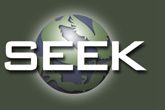|
This is version 56.
It is not the current version, and thus it cannot be edited.
[Back to current version]
[Restore this version]
Where: San Diego, CA
Venue: San Diego Supercomputer Center
When: Oct 24-28, 2005
Weather: Historical Current Current
The SEEK 2005 All Hands meeting will be a forum for discussing progress on the EcoGrid, SMS, KR, Kepler, BEAM, Taxon, and EOT activities. We expect that all funded SEEK participants will attend in order to stimulate communication and collaboration across the project. We will also be inviting colleagues from the CIPRES, NESCENT, and GEON projects to discuss opportunities for collaboration with allied disciplines. The basic agenda is presented below, although this will be adjusted as we near the meeting timeframe due to the rapid advances made by the SEEK project.
- Morning arrivals from airport
- 1:00pm Introductions (Jones)
- 1:05pm Welcome to SDSC (Vijay Samalam, Executive Director of SDSC)
- 1:15pm Plenary (Jones)
- Half hour update talks on:
- SEEK overall and Kepler (Jones)
- BEAM (Pennington)
- Taxon (Kennedy (TCS), Peet (ConceptMapper), Stewart (TOS))
- Semantic Mediation (Ludaescher)
- Knowledge Representation (Schildhauer)
- EcoGrid (Jones)
- EOT (Romanello)
- 8:00am Coffee
- 8:30 - 9:30 am Invited presentations from visiting projects
- CIPRES (30 minutes)
- NESCENT (30 minutes)
- 9:30 - 10:30 Questions and Discussion on synergy and collaboration with NESCENT and CIPRES
- 10:30 - 10:45 Break
- 10:45 - 12:00 Data Integration as 2006 goal
- Merging data sets tagged with taxonomic concepts (Peet, 15 minutes presentation)
- Discuss Taxon/SMS/Kepler Integration
- How can and should these subprojects work together to solve the data integration problem?
- 1:00 pm - 5:30pm
- Breakout: Data supporting case studies (Pennington)
- EcoGrid Breakout (Jones)
- Overview of incomplete tasks (Jones)
- Reorganization of EcoGrid code, refactoring clients
- Authentication via GAMA and GSI (report and discussion)
- EcoGrid portal
- Ontology-based searching in EcoGrid
- Taxon Breakout (Beach)
- Concept data discussion with NESCENT and CIPRES reps
- Any remaining sub-project updates
- 7:00pm Group Dinner, Location TBD
- 8:00am Coffee
- 8:30 am - 12:00 pm
- Kepler breakout
- Taxon Breakout
- Kepler complete work flow discussion including Higgins, Pennington, integration of DiGIR and SMS in use case work flow
- 12:00pm - 1:00pm Lunch
- 1:00 pm - 5:30 pm
- Extracting concepts from online sources (Susan, Aravind)
- Usability thread: bat project (Laura)
- May Tutorial Workshop Planning, Pennington for Romanello-Katz, Beach
- 8:00am Coffee
- 8:30 am - 12:00 pm
- Knowledge Representation / Annotation Breakout
- Overview of charge (Schildhauer, 15 minutes + 15 minutes discussion)
- GrOWL ontology editor (Krivov, 15 minute presentation + 15 minute discussion)
- Status of existing ontologies (Madin, 30 minutes presentation + 30 minutes discussion)
- 10:30-10:45 Break
- Ontologies in Kepler
- Storing and Managing Ontologies in Kepler
- Support for versioning, accessing, classifying, etc.
- Central versus Distributed storage
- Conventions for Kepler/SEEK ontologies
- LSIDs for identifying ontologies
- Labels (for concept and role names) and comments
- Storing ontologies in multiple versus one file (what should go in a single file?)
- Ontology curation and population in Kepler
- Allowing users to upload/provide new ontologies to Kepler
- Supporting multiple ontologies for actor quick search
- Ontology editing w/in Kepler
- Making Ontologies convenient for Kepler users
- Support for "views" and "templates", i.e., interfaces and methods for filtering, organizing, summarizing, and visualizing Ontologies
- Tools for SEEK ontology development
- Glossary support
- Documentation
- Browsing, familiarization
- Organization; "templates" and "views" (e.g., biodiversity templates, etc.)
- Improving the Annotation Tool
- Filling in Annotations via ontology constraints
- Defining what makes a "good" annotation, and how to guide users towards these
- Improvements to the UI, including selecting ontologies and "templated" annotations
- Working exercise: building annotations
- Target case studies: ENM and Biodiversity
- Start as whole group, discuss actor/data annotation needs and differences
- Possibly break into subgroups to work on annotations
- Taxon Breakout
- Update of EML to accomodate Taxon Concepts (Peet, Franz, Jones)
- May 2006 Taxon-oriented SEEK workshop, NM (with Deana)
- Future Plans: events, objectives, deliverables
- 12:00pm - 1:00pm Lunch
- 1:00 pm - 5:30 pm
- Semantic Mediation / Data Integration Breakout
- Overview of charge (Ludaescher, 15 minutes + 15 minutes discussion)
- SCIA integration in Kepler (Wang, 15 minute presentation + 30 minute discussion)
- Working exercise: data integration approaches
- Case study requirements for integration
- Simple "smart" concatenation
- Extending to more complex (and realistic) examples
- Adequacy of annotations and ontologies for integration
- Data Management support for sms
- The EML actor as entry point for data integration
- How do we deal with multiple output formats from EML?
- How do we deal with null values?
- How do we carry out integration specifications given by sms?
- For example, using "R" to load instance data from multiple voluminous data sets (e.g., 3 100MB data files) and executing data integration "recipes"
- A database-style approach? (e.g., SQL)
- What approach do we use for representing data conversions?
- Examples: unit conversions, count/area = density, rescaling/projection
- Represent conversions within ontology?
- Represent conversions as actors (searched via annotations, e.g.)
- Define a new or leverage an existing representation for conversions (Prolog, SWRL, XML syntax a la STMML, MoML attributes)
- Use potpourri approach (i.e., try to accomodate multiple mechanisms)
- Taxon Breakout
- Bob Peet leaves; Less critical items
- NESCENT workshop proposal
- ESA Booth
- 8:00am Coffee
- Plenary
- BEAM Use cases: what needs to be accomplished
- 12:00pm - Adjourn
- Travel back to home institutions, only schedule flights that leave after 2:00 pm
All SEEK participants
Invited participants form other projects
|










 Current
Current